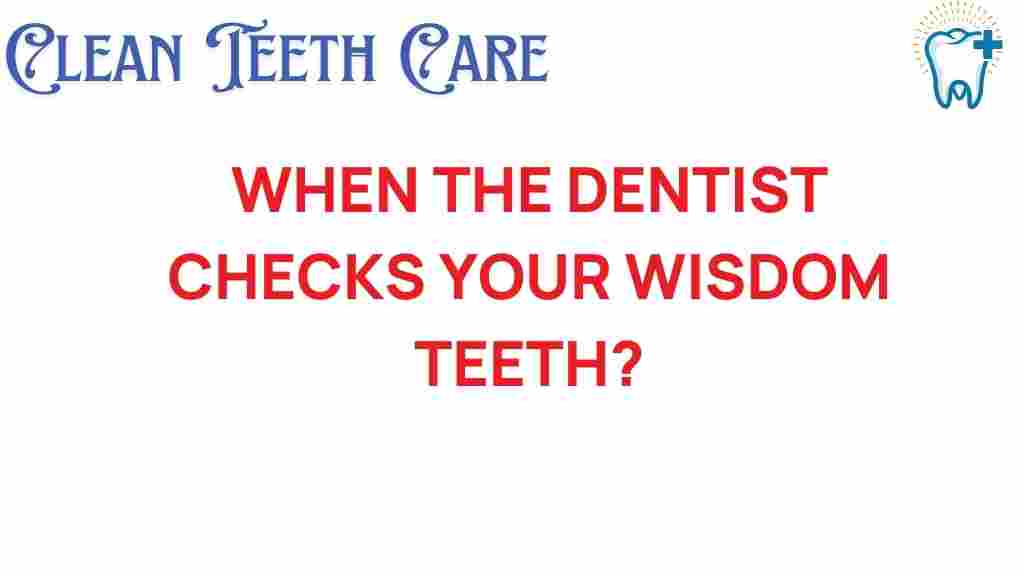Unveiling the Mystery: When Should You See the Dentist for Wisdom Teeth?
Wisdom teeth, also known as third molars, are the last set of teeth to emerge in the back of your mouth, typically between the ages of 17 and 25. While some people have no issues with their wisdom teeth, others may experience complications that necessitate a dental visit. Understanding when to see your dentist regarding wisdom teeth is essential for maintaining dental health and ensuring effective oral care. In this comprehensive article, we will explore the signs that indicate a need for dental examination, the importance of preventative care, and pain management strategies for wisdom teeth issues.
Understanding Wisdom Teeth
Wisdom teeth are a remnant of our evolutionary past, serving a purpose for our ancestors who had a diet requiring more chewing power. However, in modern times, these teeth often lead to dental problems due to changes in diet and jaw size. Here’s what you need to know:
- Impaction: Many individuals experience wisdom teeth that become impacted, meaning they do not fully emerge through the gums.
- Alignment Issues: Wisdom teeth can cause crowding, pushing other teeth out of alignment.
- Infection Risk: Partially erupted wisdom teeth can trap food and bacteria, leading to infections.
- Cysts Formation: In some cases, cysts can develop around impacted wisdom teeth, potentially damaging surrounding teeth and bone.
Signs You Should See the Dentist
Recognizing the signs that warrant a visit to the dentist for wisdom teeth is crucial. Here are some common symptoms to watch for:
- Pain: Persistent pain in the back of your mouth can indicate problems with your wisdom teeth.
- Swelling: Swelling in the gums or jaw can suggest infection or inflammation.
- Difficulty Opening Your Mouth: If you find it hard to open your mouth fully, it could be a sign of dental issues.
- Bad Breath: Chronic bad breath despite good oral hygiene can indicate an issue with your wisdom teeth.
- Tooth Decay: If you notice cavities forming in the molars adjacent to your wisdom teeth, it may be time to consult your dentist.
The Importance of Dental Examinations
Regular dental examinations are essential for maintaining your overall dental health, especially concerning wisdom teeth. During your visit, your dentist will:
- Perform a thorough examination of your mouth and teeth.
- Take X-rays to assess the position of your wisdom teeth.
- Discuss any symptoms or concerns you may have regarding your oral care.
- Determine if extraction is necessary based on the health of your teeth and gums.
Preventative Care for Wisdom Teeth
Preventative care is vital to avoid complications associated with wisdom teeth. Here are some tips to help manage your oral hygiene:
- Regular Dental Visits: Schedule dental check-ups at least twice a year.
- Maintain Good Oral Hygiene: Brush and floss regularly to prevent decay and gum disease.
- Use Mouthwash: Antimicrobial mouthwash can help reduce bacteria around your wisdom teeth.
- Watch Your Diet: Limit sugary foods that can contribute to tooth decay.
Managing Pain and Discomfort
If you are experiencing pain related to your wisdom teeth, managing the discomfort is crucial. Here are some effective pain management strategies:
- Over-the-Counter Pain Relievers: Medications like ibuprofen or acetaminophen can help alleviate pain.
- Cold Compress: Applying a cold compress to the outside of your jaw can reduce swelling and numb pain.
- Saltwater Rinse: Rinsing with warm saltwater can help soothe irritated gums.
- Avoiding Hard Foods: Stick to soft foods to minimize discomfort while eating.
Step-by-Step Process for Wisdom Tooth Extraction
If your dentist determines that extraction is necessary, here’s what you can expect during the procedure:
- Consultation: Discuss the procedure, anesthesia options, and any concerns with your dentist.
- Preparation: You may be advised to avoid certain medications before surgery.
- Procedure: The dentist will administer anesthesia and extract the wisdom teeth, which may be done via local anesthesia or sedation, depending on the complexity.
- Post-Operative Care: Follow the dentist’s instructions for recovery, including pain management and oral care tips.
Troubleshooting Tips Post-Extraction
After having your wisdom teeth removed, it’s important to monitor your recovery. Here are some troubleshooting tips:
- Watch for Excessive Bleeding: If bleeding persists, contact your dentist.
- Monitor for Infection: Be aware of signs of infection, such as increased pain, swelling, or fever.
- Follow Dietary Restrictions: Stick to a soft diet for at least a few days post-surgery.
- Maintain Oral Hygiene: Gently clean your mouth, but avoid the extraction site for the first 24 hours.
Conclusion
Wisdom teeth can pose various challenges to your dental health, making it crucial to stay informed about when to visit the dentist. By recognizing the signs of complications, understanding the importance of preventative care, and effectively managing pain, you can maintain optimal oral hygiene and health. If you suspect you have an issue with your wisdom teeth, do not hesitate to schedule a dentist visit. Remember, proactive care is the key to long-lasting dental health.
For more information on oral care and dental health, feel free to check out this resource.
This article is in the category Treatments and created by CleanTeethCare Team
